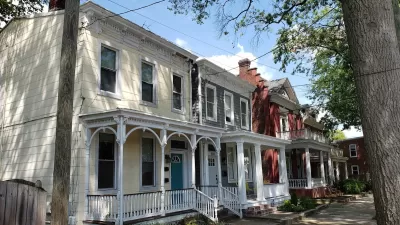A new report by the Center for Budget and Policy Priorities finds major flaws with property taxes in several states, and proposes a solution that could mitigate the least desirable consequences of limits to property tax increases.

Brian J. Charles shares the findings of a new report by the Center for Budget and Policy Priorities (CBPP) that issues a sharp critique of property tax caps.
The tax caps, which first became popular during the 1970s tax revolt and have since spread to 44 states plus the District of Columbia, have created fiscal stress for the states that adopted the limits. As a result, states have cut aid to cities and counties, and municipalities have become more reliant on sales taxes and fees that disproportionately hurt the poor and people of color.
The study examined property taxes in Michigan, Massachusetts, Oregon, and New York, explains Charles. The findings show evidence that the caps "strangle" funding for public education, "which the researchers see as a pathway for minority and low-income children to move up the socioeconomic ladder," while benefitting wealthy white homeowners, "because they have historically owned homes at a greater rate than people of color and on average own more valuable homes."
The Center for Budget and Policy Priorities (CBPP) includes a proposed solution to solve these issues in the report. "Right now, most states limit the annual increase in property taxes to 1.5 or 2.5 percent or the rate of inflation -- whichever number is lower. Setting the limit instead at whichever number is higher, the researchers say, would provide more cash for governments and make revenues more predictable," explains Charles.
For more on the property tax situation around the country, see also Planetizen coverage of the Lincoln Institute of Land Policy's annual "50-State Property Tax Comparison Study."
FULL STORY: The Downsides of Property Tax Caps

Alabama: Trump Terminates Settlements for Black Communities Harmed By Raw Sewage
Trump deemed the landmark civil rights agreement “illegal DEI and environmental justice policy.”

Study: Maui’s Plan to Convert Vacation Rentals to Long-Term Housing Could Cause Nearly $1 Billion Economic Loss
The plan would reduce visitor accommodation by 25% resulting in 1,900 jobs lost.

Planetizen Federal Action Tracker
A weekly monitor of how Trump’s orders and actions are impacting planners and planning in America.

Wind Energy on the Rise Despite Federal Policy Reversal
The Trump administration is revoking federal support for renewable energy, but demand for new projects continues unabated.

Passengers Flock to Caltrain After Electrification
The new electric trains are running faster and more reliably, leading to strong ridership growth on the Bay Area rail system.

Texas Churches Rally Behind ‘Yes in God’s Back Yard’ Legislation
Religious leaders want the state to reduce zoning regulations to streamline leasing church-owned land to housing developers.
Urban Design for Planners 1: Software Tools
This six-course series explores essential urban design concepts using open source software and equips planners with the tools they need to participate fully in the urban design process.
Planning for Universal Design
Learn the tools for implementing Universal Design in planning regulations.
Caltrans
Smith Gee Studio
Institute for Housing and Urban Development Studies (IHS)
City of Grandview
Harvard GSD Executive Education
Toledo-Lucas County Plan Commissions
Salt Lake City
NYU Wagner Graduate School of Public Service





























